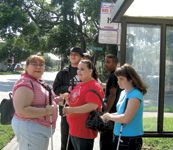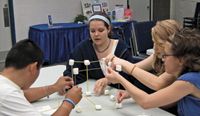Teens with visual impairments applaud transition program
Teens with blindness or low vision face a greater number of hurdles as they transition to adult life. Making a successful transition can require not only academic training but also vocational, social, and personal development.

Key Points

A study titled "After one year: Self-reported transition skills of teens with visual impairments," published in the Spring 2009 issue of AER Journal: Research and Practice in Visual Impairment and Blindness, reports on these students' evaluations 1 year after their first experience with the summer program.
The study was written by Julie A. Bardin, PhD, North Carolina Central University, Durham; Tammy Jorgensen-Smith, PhD, University of South Florida, Tampa; and Sandra Lewis, EdD, Florida State University, Tallahassee.

Surprisingly, no significant differences were found between students who read only Braille and those who read print, between male and female students, and between students who did and did not have previous work experience.
To measure long-term changes in skills and attitudes, students were assessed once a year rather than immediately following completion of the first year of the program. The assessments are used for individual program planning.
"Because the Transition Competencies Checklist taps into students' perceptions of their own skill levels, it is more likely to result in a student-centered plan for transition that engages students' natural motivations and is relevant," the authors reported.
To read the full text of the article, go to http://www.allenpress.com/pdf/aerj-02-02-84-96.pdf.